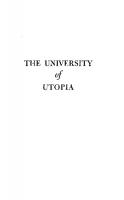From the Pandemic to Utopia (Epistemologies of the South) 9781032355573, 9781032355597, 9781003327400, 1032355573
The coronavirus pandemic forces us to rethink our contemporaneity. It has brought to the surface dimensions of human fra
119 84 3MB
English Pages 262 [263]
Table of contents :
Cover
Half Title
Series Page
Title Page
Copyright Page
Table of Contents
Preface
Part One The 21st Century Presents Itself
1 The Pandemic and the Contradictions of Contemporaneity
The End of Presentism
All That is Solid Melts into Air
The Scale of the Planet Viewed by the Virus
Metaphors in Progress
The Coronavirus, our Contemporary
2 Abyssal Capitalism: The Pandemic as Business
Scene 1. Profiting from the Pandemic
Scene 2. Buccaneer Capitalism
Scene 3. Profiting from the Post-Pandemic: The Legal Industry and big Business
Scene 4. The Value of life and Medical and Pharmaceutical Research: Investments, the Cost of Tests, Vaccines, Medicines and Big Pharma
Conclusion
3 The Open Veins of Inequality and Discrimination
Introduction
Economic Abyssal Lines
Racist-Colonialist Abyssal Lines
Sexist Abyssal Lines
Religious Abyssal Lines
Ableist Abyssal Lines
Gray or Intermediate Exclusion Areas
The Degree zero of Human Tragedy
4 Community Resistance and Self-Organization
Community Resistance
Rural and Urban Popular Organizations in Latin America Faced with Abandonment by the State
The Indigenous Peoples of Latin America
Best Practices of Sub-National or Autonomous Political-Administrative Units
Conclusion
Part Two The Future Starts Now
5 Three Scenarios: Between Hell Redux and Kairós
First Scenario: Everything as Before and Worse. Abyssal Capitalism and the Securitarian State of Exception
Second Scenario: Capitalist Skin, Socialist Mask: The New Neo-Keynesianism
Third Scenario: Barbarism or Civilization – Alternatives to Capitalism, Colonialism and Patriarchy
6 Towards an Insurgent, Intercultural and Cosmopolitan Declaration of Human Rights and Duties
Introduction
Rights and Duties to be Shared in a Conversation for Humankind: A Legal Real Utopia
Conclusion
7 The Paradigmatic Transition: A World to Accommodate Many Worlds
The Principles of Transition
Monocultures
Ecologies
Conclusion
8 First Steps in the Paradigmatic Transition
Nature Does not Belong to us: We belong to Nature
Health is a Public Good, not a Business
Without Losing their Respective Identities, Cities must be Ruralized and the Country must be Urbanized
Culture and Art – Understood as Ecologies of Multiple and Intercultural Artistic and Cultural Practices – Are an Essential Component of the Paradigmatic Transition
We Cannot live Without Demodiversity any More than we can live Without Biodiversity
In a Time of Intermittent Pandemic, International Relations must be Guided by the Principle of Overriding Public Interest in the Defense of Life
Conclusion
Epilogue: What if we Failed? To be Read in 2050
References
Index
Cover
Half Title
Series Page
Title Page
Copyright Page
Table of Contents
Preface
Part One The 21st Century Presents Itself
1 The Pandemic and the Contradictions of Contemporaneity
The End of Presentism
All That is Solid Melts into Air
The Scale of the Planet Viewed by the Virus
Metaphors in Progress
The Coronavirus, our Contemporary
2 Abyssal Capitalism: The Pandemic as Business
Scene 1. Profiting from the Pandemic
Scene 2. Buccaneer Capitalism
Scene 3. Profiting from the Post-Pandemic: The Legal Industry and big Business
Scene 4. The Value of life and Medical and Pharmaceutical Research: Investments, the Cost of Tests, Vaccines, Medicines and Big Pharma
Conclusion
3 The Open Veins of Inequality and Discrimination
Introduction
Economic Abyssal Lines
Racist-Colonialist Abyssal Lines
Sexist Abyssal Lines
Religious Abyssal Lines
Ableist Abyssal Lines
Gray or Intermediate Exclusion Areas
The Degree zero of Human Tragedy
4 Community Resistance and Self-Organization
Community Resistance
Rural and Urban Popular Organizations in Latin America Faced with Abandonment by the State
The Indigenous Peoples of Latin America
Best Practices of Sub-National or Autonomous Political-Administrative Units
Conclusion
Part Two The Future Starts Now
5 Three Scenarios: Between Hell Redux and Kairós
First Scenario: Everything as Before and Worse. Abyssal Capitalism and the Securitarian State of Exception
Second Scenario: Capitalist Skin, Socialist Mask: The New Neo-Keynesianism
Third Scenario: Barbarism or Civilization – Alternatives to Capitalism, Colonialism and Patriarchy
6 Towards an Insurgent, Intercultural and Cosmopolitan Declaration of Human Rights and Duties
Introduction
Rights and Duties to be Shared in a Conversation for Humankind: A Legal Real Utopia
Conclusion
7 The Paradigmatic Transition: A World to Accommodate Many Worlds
The Principles of Transition
Monocultures
Ecologies
Conclusion
8 First Steps in the Paradigmatic Transition
Nature Does not Belong to us: We belong to Nature
Health is a Public Good, not a Business
Without Losing their Respective Identities, Cities must be Ruralized and the Country must be Urbanized
Culture and Art – Understood as Ecologies of Multiple and Intercultural Artistic and Cultural Practices – Are an Essential Component of the Paradigmatic Transition
We Cannot live Without Demodiversity any More than we can live Without Biodiversity
In a Time of Intermittent Pandemic, International Relations must be Guided by the Principle of Overriding Public Interest in the Defense of Life
Conclusion
Epilogue: What if we Failed? To be Read in 2050
References
Index

- Author / Uploaded
- Boaventura de Sousa Santos



![Decolonizing Constitutionalism: Beyond False or Impossible Promises (Epistemologies of the South) [1 ed.]
1032490314, 9781032490311](https://ebin.pub/img/200x200/decolonizing-constitutionalism-beyond-false-or-impossible-promises-epistemologies-of-the-south-1nbsped-1032490314-9781032490311.jpg)





